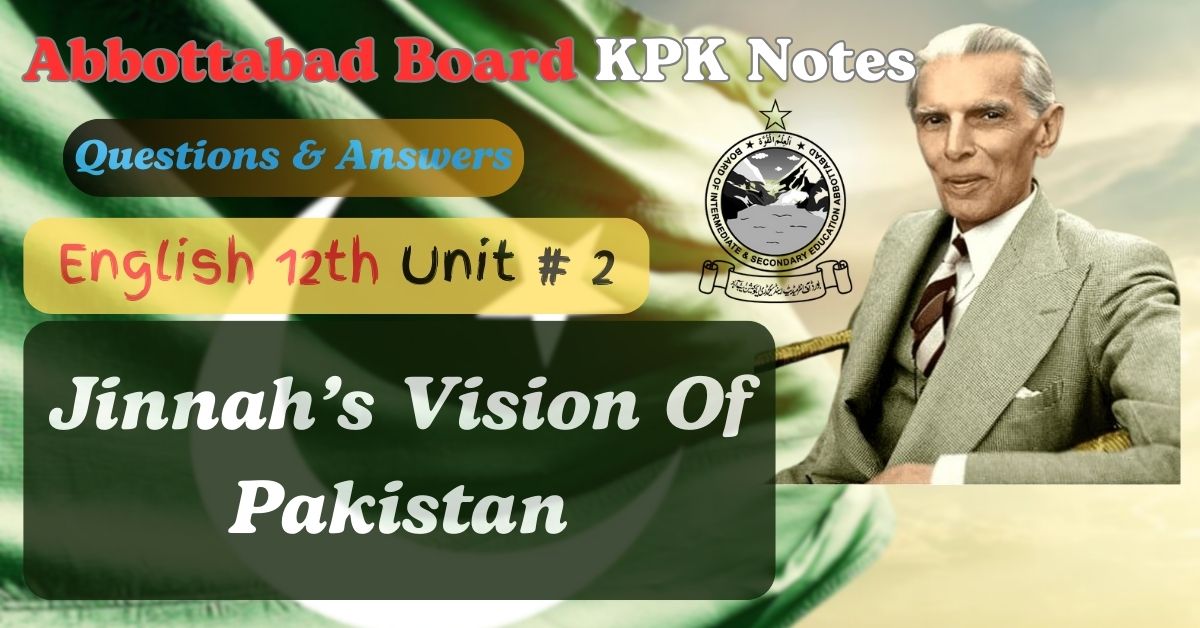Jinnah’s Vision of Pakistan Notes of Questions and Answers suitable for Abbottabad Board. Notes for Class 12th Unit # 2 Abbottabad Board, enjoy the notes and also share with others. Please click on the Question below!
Q.1: What were the two main functions of the first constituent assembly of Pakistan as mentioned by Muhammad Ali Jinnah in his speech?
Answer:
Muhamamd Ali Jinnah mentioned in his speech that there were two main functions of the constituent assembly. The first is the task of framing the future constitution of Pakistan and second is to work as a sovereign body as the federal legislature of Pakistan.
Q. 2: What is the unprecedented cyclonic revolution which Quaid-e-Azam has talked about in his speech? Why did he call it unprecedented?
Answer:
The plan of creating and establishing two independent sovereign states in the sub continent is the unprecedented cyclonic revolution. It is unprecedented because it is unparalleled and achieved through peaceful means.
Q. 3: How did Quaid-e-Azam Muhammad Ali Jinnah express feelings about bribery, corruption, nepotism, and jobbery?
Answer:
Quaid-e-Azam says that bribery and corruption are the biggest curses. This is poison for our country. Similarly, nepotism and jobbery are also social evils that have been transferred to our new generation. He makes it clear that such practices will never be tolerated, anywhere and in any form.
Also Read: 2nd year Notes Unit # 4
Q. 4: What were Muhammad Ali Jinnah’s views about the partition of India? Describe in a few lines.
Answer:
Quaid-e-Azam called the partition of India a mighty and unprecedented revolution. It was the only solution to India’s constitutional problem, although many people were against this division. He also said that future history would justify it.
Q.5: What in the eyes of the Quaid-e-Azam was the biggest hindrance in the way of India to attain freedom of foreign occupation?
Answer:
The disparity between majority and minority communities is the biggest hindrance in the way of India to attain freedom and foreign occupation. Muslims have been divided into Pathans, Punjabis, Shias, Sunnis, and so on while Hindus have Brahmins, Vaishnavas, Khatris, Bengalis, and Madrasis. If all these people had been United they would have been free people long ago.
Q. 6: Describes Quaid-e-Azam’s view about the minorities as expressed in his address to the first constituent assembly.
Answer:
Quaid-e-Azam said about minorities that they are equal citizens of one state having equal rights. They are free to profess their own religion and free to go to the respective places of worship. It is the duty of the government to protect their lives and property.
Also Read: All 2nd Year Notes
Q. 7: What kind of freedom did Muhammad Ali Jinnah envision for the people of Pakistan in general?
Answer:
Mohammad Ali Jinnah said that all people have freedom of thought and expression they have equal rights. Religion is a personal belief which has nothing to do with business or that otherwise each and every citizen is equal in the state of Pakistan.
Q. 8: What did Muhammad Ali mean by hindu’s would seas to be Hindus in Muslims would seems to be Muslims?
Answer:
Muhammad Ali Jinnah was of the opinion that Muslims and Hindus have equal rights as citizens of one state respective of religion caste or Creed religion is a personal fate of the individual but politically they are one and equal they will not consider themselves as Hindus or Muslims while living in one state are equal citizens.
Also Read: Figures of Speech: 15 Most Used Literary Devices notes
Q. 9: After reading this important speech of the Quaid-e-Azam Muhammad Ali Jinnah, what do you think of Pakistan?
Answer:
We enough Pakistan was late it will be a welfare state cheating the majority and minority equally and every citizen will enjoy equal rights and work for the country with devotion everyone will be free in processing and practicing religious beliefs these things will have nothing to do with the business of the state it will be a sovereign state free of corruption, bribery and nepotism.
Q. 10: Read the last paragraph of the speech and state what were the guiding principles of Muhammad Ali Jinnah and also elaborate the significance of these principles.
Answer:
The guiding principles of Quaid-e-Azam are the principle of justice and fair play without partial or fabric. These are really signal principles because these are the keys of success piece progress in prosperity of the country these Golden principles make nations great.
Also Read: Unit No 3: Solitary Reaper (Poem)
Please share with other students to help them in their studies using the share buttons below!
